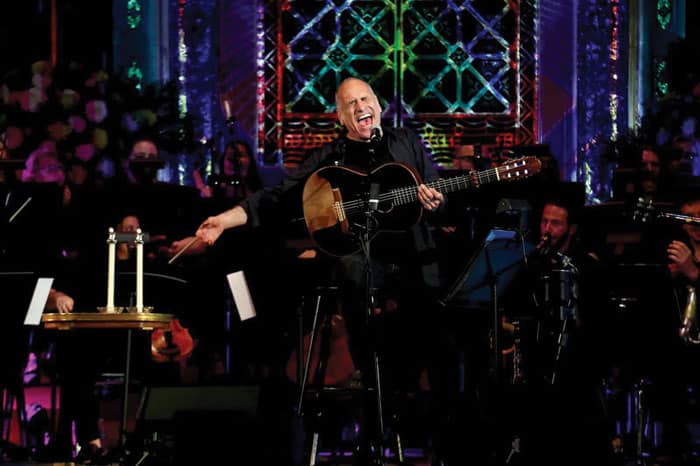
In the cannon of Jewish music, one of the most famous songs is David Broza’s “Yihye Tov” which can be translated as “It Will Be Good” or “Things Will Get Better.”
But things are not as good as we would like them to be. There is not a whiff of a word on how Israelis and Palestinians will make peace. And in America, numbers show alarming rates of antisemitic attacks. But Broza, 67, never loses hope. He reflected recently on the enduring legacy of his powerful track, the present and the future.
“It’s my most emotional song and I’ve played it for years all over the world and it still casts a spell,” Broza told The Journal. “I’ve performed it since 1977. I’ve performed it in war zones, schools, arenas and many places. The song is where I planted my flag.”
Broza said the desire to use music to spur positivity, help others and bridge the gap between different people who may oppose each other, notably Israelis and Palestinians, has always been a part of him.
“I got it from my mother’s milk when she was breastfeeding me,” Broza said. “My father had a sport club for the handicapped and my grandfather was involved in conflict resolution and founded ‘Neve Shalom,’ the peace settlement.”
Asked about rises in antisemitism and attacks in New York and Los Angeles, Broza said it is troubling but not surprising.
“There is always an evolution of things,” Broza said. “Antisemitism is awful, and we should speak out against it and fight against it. We have always had people who hate us. We see that the Jewish people have come together and are strong. From the pogroms to the Holocaust, we have an obligation to remember history and learn from it. But today, we have strength and should be inspired by it. We should not look at the situation like all is lost. This is not the time of the Turkish empire. We are living in different times.”
Broza was the subject of a 2014 documentary, “East Jerusalem/West Jerusalem,” that is available on Amazon Prime and chronicles the eight days he recorded the song and album of the same name in East Jerusalem. It includes collaborations with such artists as Wyclef Jean and Mira Awad. It shows Broza traveling to the Shuafat Refugee Camp, and he says that while any political solution will be difficult, it is important for individuals to take the steps to connect and have empathy for one another.
Broza said he is aware that those who still speak about peace prospects can be naive, but said The Abraham Accords serve as evidence that the unexpected can happen.
Broza said he is aware that those who still speak about peace prospects can be naive, but said The Abraham Accords serve as evidence that the unexpected can happen.
“That was a positive thing that people said could never happen,” Broza said. “Of course, that is not the same as peace between Israelis and Palestinians. But it shows that nobody is a prophet. I think there can be peace. I don’t know if it will be 10 years or 50 years, I wish there would be peace yesterday. In this new generation, it would make sense for people to look around and see peace is happening with other countries and realize that enough blood has been spilled. There were mistakes in the past. Everybody knows that. The question is, what can be done for the future?”
Broza said he hoped that people all over the world would also fight against racism and hate of all kinds.
He started a nonprofit called One Million Guitars to provide guitars to students in underprivileged areas which has given out guitars to Israeli and Arab children as well as students in 43 states in America. At a minimum, he hopes it will give them a sense of confidence that people care about them, and if some wind up starting a musical act in New York or in Hollywood, all the better, in his eyes.
Broza said his experience as an Israeli soldier in the Lebanon War in 1982 shook him. “It didn’t at all impact my ability to function, but it definitely stressed me and had an impact on me,” he said.
Broza added that peace should not be viewed as a fairy tale. “I think it is important to push for peace even at a time when people will say it’s pragmatic to expect that result, Broza said. “I think it’s pragmatic when there have been so many years without it.”
Born in Haifa, Broza, who has also lived in Spain and the United States, said it is important to be positive, while not ignoring problems that need to be fixed. Broza won a medal of honor from King Juan Carlos of Spain in 2009. With more than 30 albums to his credit, including songs in Hebrew, English and Spanish, Broza, also known for the iconic love song, “Mitachat Lashamayim” or “Under The Sky” plans to keep on performing and recording.
“I’m 67, I feel good, and I love connecting with audiences,” Broza said.

































 More news and opinions than at a Shabbat dinner, right in your inbox.
More news and opinions than at a Shabbat dinner, right in your inbox.